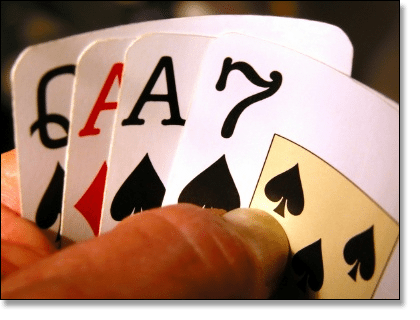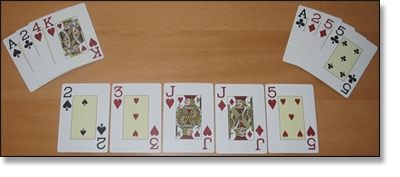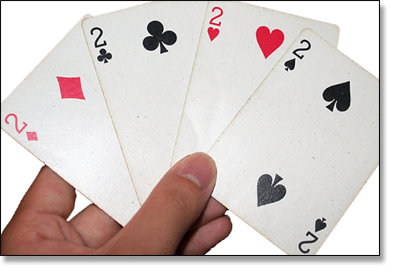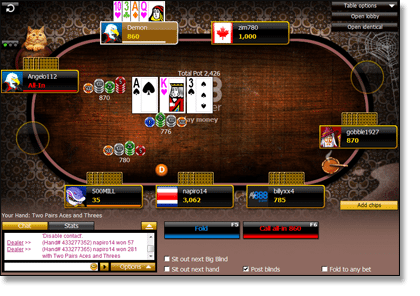 For cash games and poker tournaments, Pot Limit Omaha (PLO) ranks second only to No Limit Texas Hold’em in worldwide popularity. While this setup shares many commonalities with Holdem poker, the subtle differences in gameplay and betting make PLO a different beast altogether.
For cash games and poker tournaments, Pot Limit Omaha (PLO) ranks second only to No Limit Texas Hold’em in worldwide popularity. While this setup shares many commonalities with Holdem poker, the subtle differences in gameplay and betting make PLO a different beast altogether.
In this article we will show you the ropes – including the basic rules, what “pot limit” means, and the different kinds of Omaha games we Australians can find.
How to Play Omaha Poker
The exact origins of Omaha Hold’em (as it was originally known) are murky, but there is one consistency which binds all card games bearing the name of Nebraska’s largest city: players must use exactly two of their hole cards to form a hand.
In modern-day Omaha games, each player is dealt four down cards – or pocket cards – at the start of the hand, which we keep hidden from our opponents. Five community cards are then dealt face up on the table in the following fashion, with betting rounds in between each stage:

- First three up cards, called “the flop”
- Fourth up card, called “the turn” or “fourth street”
- Fifth and final up card, called “the river” or “fifth street”
The aim of the game is to form the strongest possible five-card poker hand by combining two of your four hole cards with three of the five community cards. This is slightly different to Texas Hold’em, where we only receive two hole cards and can use any number of them in conjunction with those on the board. For example: in Hold’em poker, we could use one hole card and four community cards, whereas in Omaha we must always use exactly two hole cards and exactly three up cards to create a hand.
Betting Rounds
In terms of when we can decide whether to bet, check, call, or fold, Omaha follows the same basic structure as No-Limit Hold’em (NLH). Some versions start with an ante, which is a compulsory bet paid by all players to make sure there is always something in the pot – that is, the prize pool for each hand. These days, however, the ante is rarely used in online flop poker or competitive play.
Blinds
Rather than antes, most Omaha tables these days instead use blinds – forced bets covered only by the two players left of the dealer button, which moves clockwise around the table after each hand. The small blind is immediately left of the dealer, and the big blind is to the left of the small blind.
The little blind is traditionally half the amount of the larger blind, which itself is equal to the size of the minimum bet for that hand. So, for example: if the small blind is $1, then the big blind will usually be $2, and the minimum wager in the following betting round will also be $2.
Note: blinds count as active wagers in the pre-flop round, which means they contribute to any further betting. For instance: say we are the big blind at $5, and by the time the actions gets to us, the call size is $10. Because we already have $5 on the table, we only need to add a further $5 to match the call.
Pre-Flop & Flop
Once the blinds are up and the hole cards are dealt, it’s time for the first betting round. This is called the “pre flop”. Betting starts with the player left of the big blind, who can either bet, check, or fold. To call, the player must match the big blind; and to raise, he must bet at least double the amount of that minimum bet, but not exceed the total amount of the pot (as we will discuss in more detail shortly).
Once the betting has ceased and all players have either met the highest bet or folded, the first three community cards are dealt – aka, the flop – after which the second betting stage ensues. Here, as in all rounds after, the play starts immediately on the dealer’s left – that is, with whomever put up the small blind.
The Turn & The River
The third round of betting follows the turn, when the fourth community is dealt; and the final chance to make wagers comes after the river, when the fifth and final up card is displayed. If there is more than one man still standing after fifth street, we enter a showdown where all live players reveal their cards. He/she with the highest-ranking poker hand – as formed by the combination of two hole cards and three from the board – wins the pot.
Pot Limit Rules
There are three main kinds of betting rules for poker: fixed limit, pot limit, and no limit. In fixed-limit poker (often just called “limit”) we can only bet in certain predetermined amounts, while in no-limit games we can go “all in” and play our entire stack in a single wager. In pot limit, however, the maximum bet is equal to the total amount in the live pot for that hand – including all chips on the table.
Here’s an example:
The flop has just been dealt, there is $50 in the pot, and nobody has opened the betting yet. We’ve got a very good hand and we want to raise the maximum amount. Because there has been no betting action yet in this round, the most we can wager is $50.
Now, the player to our left also fancies his/her hand and wants to play the max as well. Because we raised the stakes to $50, there is now $100 in the pot. However, the player must first call our $50 wager, which means the pot goes up to $150 and the maximum bet here is $200 – that is, a $150 raise.
Omaha Hi/Lo Split Eight or Better
A common variation on PLO poker is the high-low format, often called Omaha Hi/Lo or Omaha Eight or Better. This game introduces two new elements: low-hand poker, where the aim is to make the least valuable five-card hand; and a split pot, with half going to the winning high-hand and the other half going to the best low-hand. The run of play is otherwise identical to Omaha Hi.

In this set-up, Aces are the least valuable cards in the deck, while straights and flushes are not taken into consideration. Thus, the most powerful hand is 5 4 3 2 A, which is called “the wheel”. Pairs count against us here – so a hand of 5 4 3 2 2 would lose out to 8 7 6 5 4, for instance.
To qualify for the low half of the pot in Omaha High-Low, none of the five cards making up your best low-hand may be ranked higher than Eight – hence the term “Eight or Better”. So if your lowball combo is 8 6 4 3 2, you can play for the low pot; but if the weakest hand you can make is 9 4 3 2 A, then you don’t have a valid low poker hand.
Factors to note:
– It is possible not only to win both the high pot and the low pot at the same time, but also to have “the nuts” – the best possible hand – in both cases. For example: if we have 2C 3D 10H JH in the hole, and the board shows AH 4D 5S QH KH, then we have both the low nuts (5 4 3 2 A) and the high nuts (A K Q J 10 in Hearts) at once.
– Any one or two of our down cards can be used for both the low and high hands, as well as any three of the community cards. For example: if we have AS 4S 7D and QH in the hole, and the board shows 2D 3S 6S 9C and KS, we can use our private Ace and Four to play both low (6 4 3 2 A) and high (A K 6 4 3, all Spades).
*S = Spades, D = Diamonds, H = Hearts, C = Clubs.

– Starting with four cards of the same suit reduces a chance at a Flush, four cards of the four different suits gives no chance of a Flush, and four disconnected cards reduces the chance of a straight.
Online PLO Games
 The easiest way to find Omaha poker games on the Web is to visit 888Poker.com. Registration is free and takes but a minute, and there are thousands of ring games and Pot-Limit Omaha tournaments to choose from – including satellites where you could play your way into some of the biggest poker events in the world, such as the World Series of Poker in Las Vegas. There are also numerous options for Texas Hold’em and Seven Card Stud, and all game styles are available in real cash and play money modes. We also recommend PokerStars and Full Tilt Poker, which both offer a huge spread of Omaha freerolls, cash games, and tournaments.
The easiest way to find Omaha poker games on the Web is to visit 888Poker.com. Registration is free and takes but a minute, and there are thousands of ring games and Pot-Limit Omaha tournaments to choose from – including satellites where you could play your way into some of the biggest poker events in the world, such as the World Series of Poker in Las Vegas. There are also numerous options for Texas Hold’em and Seven Card Stud, and all game styles are available in real cash and play money modes. We also recommend PokerStars and Full Tilt Poker, which both offer a huge spread of Omaha freerolls, cash games, and tournaments.
